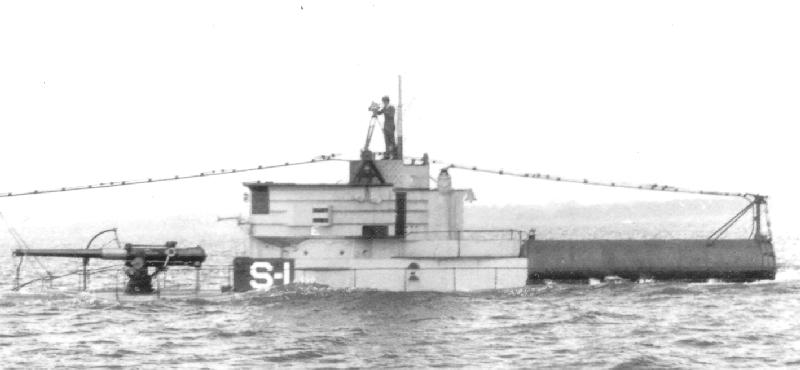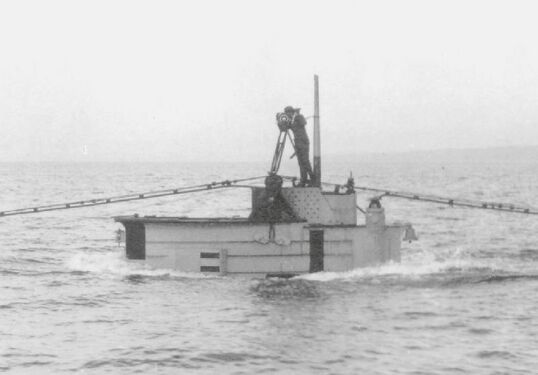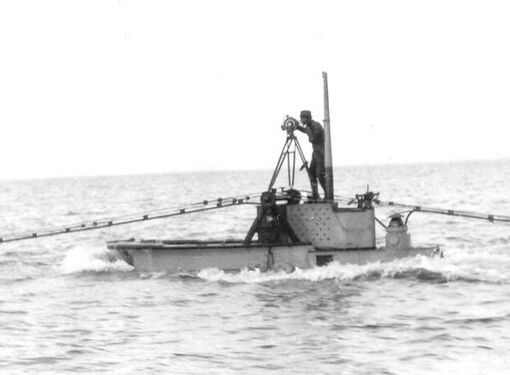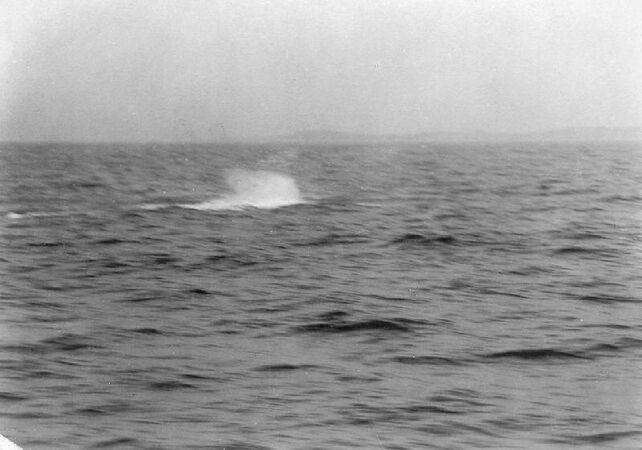S-1: Difference between revisions
No edit summary |
Pbcjohnston (talk | contribs) (Text updates) |
||
| (One intermediate revision by one other user not shown) | |||
| Line 9: | Line 9: | ||
[[File:S-1 and S-2 beaver ny-1.jpg|left|500px]] | [[File:S-1 and S-2 beaver ny-1.jpg|left|500px]] | ||
<div style="text-align: justify;"><span style="color:#00008B">S-1 ( | <div style="text-align: justify;"><span style="color:#00008B">S-1 (right) and [[S-2|'''S-2 (SS-106)''']] moored outboard of the submarine tender [https://www.navsource.org/archives/09/36/3605.htm '''USS Beaver (AS-5)'''] at New York City. The sign on the building in the background says "New York Central Line". The time frame is pretty tight as the S-2 was modified with a large, flared bow and a bow buoyancy tank soon after trials and this is missing in this photo. The S-1 was commissioned on June 5, 1920 and the S-2 on May 25, 1920 and the Beaver left July 22, 1921 for the Pacific with S-2 and others. That makes the date of this photo late summer 1920. | ||
<small>Photo courtesy of the Boston Public Library, Leslie Jones Collection. Used with permission.</small> | <small>Photo courtesy of the Boston Public Library, Leslie Jones Collection. Used with permission.</small> | ||
| Line 16: | Line 16: | ||
[[File:S-1 moore.jpg|left|500px]] | [[File:S-1 moore.jpg|left|500px]] | ||
<div style="text-align: justify;"><span style="color:#00008B">CDR Vincent John Moore was XO of the USS S-1 (SS-105) in 1921. He later became the CO of the USS [[R-9|'''R-9 (SS-86)''']]. He was a graduate of Annapolis, | <div style="text-align: justify;"><span style="color:#00008B">CDR Vincent John Moore was XO of the USS S-1 (SS-105) in 1921. He later became the CO of the USS [[R-9|'''R-9 (SS-86)''']]. He was a graduate of Annapolis, class of 1917. He served on board [http://www.navsource.org/archives/01/38a.htm '''USS Pennsylvania (BB-38)'''] when it went to Europe with President Wilson to sign the treaty ending WWI. CDR Moore retired from the Navy in 1924 due to health reasons. He was recalled to active duty in 1942 as an instructor. He passed away on December 9, 1973. | ||
<small>Photo provide by his | <small>Photo provide by his grandniece, Patricia M. Lynn.</small> | ||
[[File:Red bar sub new.jpg]] | [[File:Red bar sub new.jpg]] | ||
[[File:S-1 first airplane trial Sept-2-1926.jpg|left|500px]] | [[File:S-1 first airplane trial Sept-2-1926.jpg|left|500px]] | ||
Newspaper Photo Caption: ''THE FIRST SUBMARINE AIRPLANE IS TESTED OFF NEW LONDON<br>New London, Connecticut -- The United States Navy held the first tryout of the "Peanut Plane" off New London | Newspaper Photo Caption: ''THE FIRST SUBMARINE AIRPLANE IS TESTED OFF NEW LONDON<br>New London, Connecticut -- The United States Navy held the first tryout of the "Peanut Plane" off New London recently. It is a tiny three cylinder airplane installed in a waterproof casing on the deck of the U.S. submersible S-1 and can be launched in the short time of nine minutes. The plane weighs only 1000 pounds and is flown by the first "Submarine Pilot" LT Dolph C. Allen. Photo shows the plane completely assembled and ready for flight, which is launched by lowering the stern of the submarine. 9-2-26'' | ||
It should be noted that the launching time of nine minutes was an initial estimate only. In actual practice it turned out to be more like 30-40 minutes in calm weather and good conditions. | |||
The first full cycle of surfacing, assembly, launching, retrieving, disassembly, and submergence took place on 28 July 1926 on the Thames River at New London. | The first full cycle of surfacing, assembly, launching, retrieving, disassembly, and submergence took place on 28 July 1926 on the Thames River at New London. | ||
<small>News | <small>News photo in the private collection of Ric Hedman.</small> | ||
| Line 50: | Line 52: | ||
<div style="text-align: justify;"><span style="color:#00008B">S-1 underway for a photo opportunity at an unknown location, approximately mid 1920's. | <div style="text-align: justify;"><span style="color:#00008B">S-1 underway for a photo opportunity at an unknown location, approximately mid 1920's. | ||
<small>Photo in the private collection of Ric Hedman</small> | <small>Photo in the private collection of Ric Hedman.</small> | ||
[[File:Red bar sub new.jpg]] | [[File:Red bar sub new.jpg]] | ||
[[File:S-1 port 1.jpg|left|500px]] | [[File:S-1 port 1.jpg|left|500px]] | ||
<div style="text-align: justify;"><span style="color:#00008B">This photo was taken just a few minutes after the one above, and shows details of the S-1 fairwater, bridge, and superstructure. This is not all of the S-1's crew, and they may have only been the men assigned to operate and maintain the airplane. | <div style="text-align: justify;"><span style="color:#00008B">This photo was taken just a few minutes after the one above, and shows details of the S-1's fairwater, bridge, and superstructure. This is not all of the S-1's crew, and they may have only been the men assigned to operate and maintain the airplane. | ||
<small>U.S. Navy photo</small> | <small>U.S. Navy photo</small> | ||
Latest revision as of 21:48, 28 July 2024
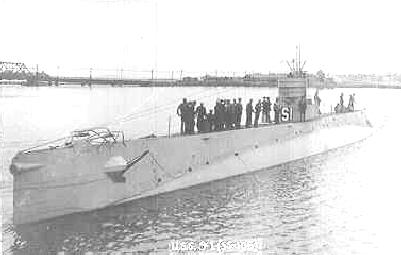
Photo in the private collection of Ric Hedman

Photo courtesy of the Boston Public Library, Leslie Jones Collection. Used with permission.
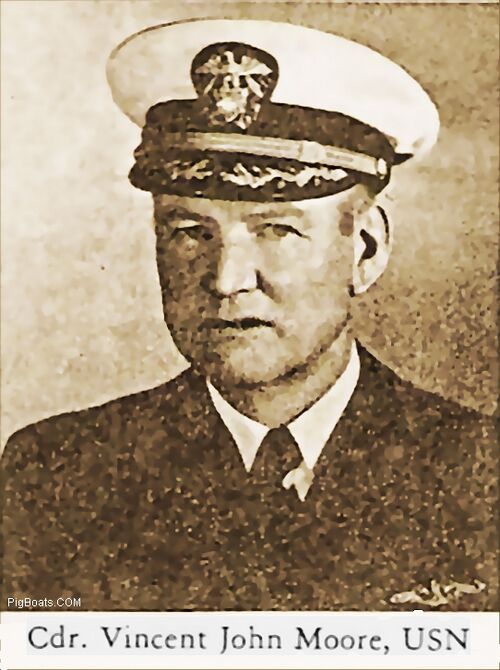
Photo provide by his grandniece, Patricia M. Lynn.
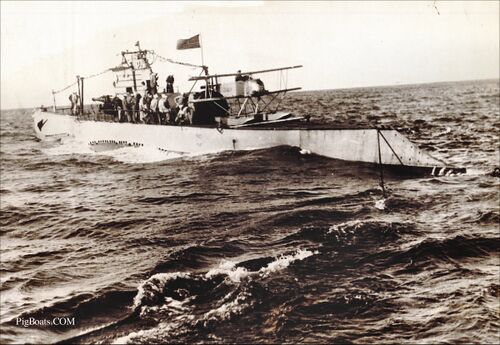
Newspaper Photo Caption: THE FIRST SUBMARINE AIRPLANE IS TESTED OFF NEW LONDON
New London, Connecticut -- The United States Navy held the first tryout of the "Peanut Plane" off New London recently. It is a tiny three cylinder airplane installed in a waterproof casing on the deck of the U.S. submersible S-1 and can be launched in the short time of nine minutes. The plane weighs only 1000 pounds and is flown by the first "Submarine Pilot" LT Dolph C. Allen. Photo shows the plane completely assembled and ready for flight, which is launched by lowering the stern of the submarine. 9-2-26
It should be noted that the launching time of nine minutes was an initial estimate only. In actual practice it turned out to be more like 30-40 minutes in calm weather and good conditions.
The first full cycle of surfacing, assembly, launching, retrieving, disassembly, and submergence took place on 28 July 1926 on the Thames River at New London.
News photo in the private collection of Ric Hedman.

U.S. Navy photo
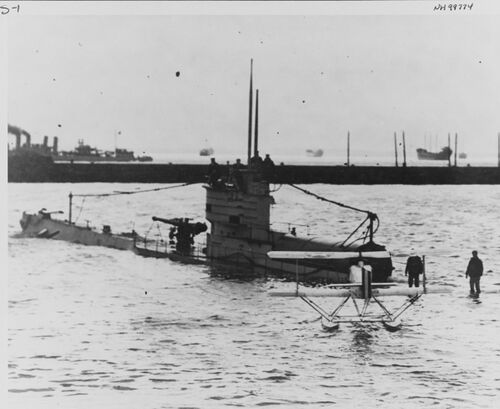
NHHC photo NH 99774.
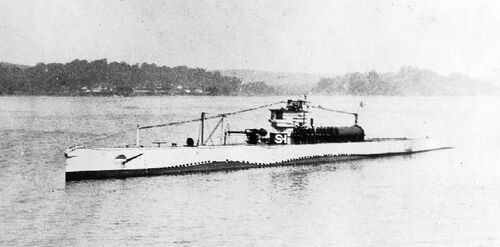
Photo in the private collection of Ric Hedman.
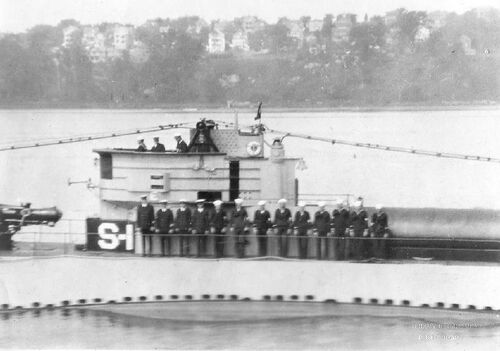
U.S. Navy photo
Photos in the private collection of Ric Hedman
Photos in the private collection of Ric Hedman

Photo in the private collection of Ric Hedman

Photo in the private collection of Ric Hedman
Page created by:
Ric Hedman & David Johnston
1999 - 2023 - PigBoats.COM©
Mountlake Terrace, WA, Norfolk, VA
webmaster at pigboats dot com

